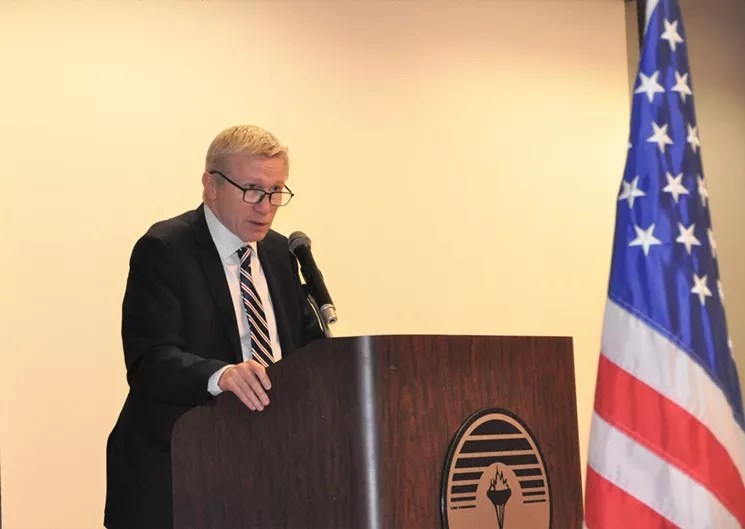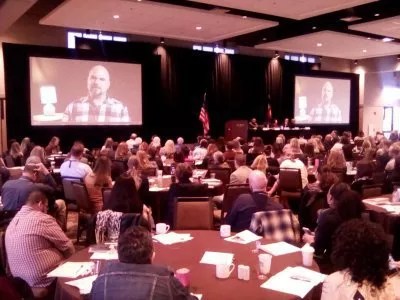
Colorado Department of Corrections

Audio By Carbonatix
Governor Jared Polis hosted the first justice-system forum of his administration on March 4 and 5 at the Westin Hotel in Westminister, where representatives of the Colorado Department of Public Safety, the Colorado Department of Corrections and the Colorado Department of Human Services, as well as judges and elected officials including district attorneys and sheriffs, met and mingled with members of victims’ advocacy and community-service groups at the Colorado Justice Systems Forum: Working Together Toward an Improved Criminal Justice System.
“Building an effective and equitable criminal-justice system requires input from all sectors in the system,” Stan Hilkey, the executive director of the Colorado Department of Public Safety, noted in his welcome to the group. “Getting state and local entities on the same page toward a common goal is tantamount to success. That’s what this forum is all about.”
Then Polis expanded on that goal. “America was doing a poor job, and I would like to see Colorado lead the nation in criminal-justice reform,” the governor said in his opening remarks. “Colorado’s corrections budget is nearly $1 billion annually and growing. Our system will promote public safety, treat people with dignity and reduce crime. In the course of this transformation, we will save taxpayers money. We are going to have to produce quantifiable results to get the public on board with the changes we will make. We do that by reducing the rate of recidivism and crime in our communities. I know we can do this, because many nations in the world do this better than we do.”
Colorado’s recidivism rate is approximately 50 percent over three years. In contrast, only 20 percent of the people released from Norway’s prisons return to them; that’s the lowest recidivism rate in the world. Dean Williams, the executive director of the Colorado Department of Corrections, pointed out that between 1970 and 1980, Norway’s rate of recidivism was similar to that of Colorado’s. Norway made its dramatic change by treating its prisoners with compassion, he said, and by having everyone in the community play an integral role in their success.
Now he wants communities across Colorado to do their bit. “Tell the truth,” he urged his audience. “Even if you think my ideas are crazy, speak your mind. When we have no dialogue, we have nothing.”

A breakfast breakout.
Michael McCarthy
Williams wants to change the culture of prison life; he calls it “normalization.” What he discovered as Alaska’s Commissioner of Corrections and through his travels is that when you treat prisoners with dignity and respect, profound change occurs on the inside, he explained. Prisons become safer, and the prisoners, men and women alike, are better prepared for their release.
Williams envisions prisoners cooking their own food, doing their own laundry, and even working real jobs out in the community. To make that possible, he went to owners of Opal Foods in Roggen and persuaded them to hire some prisoners. Through a pilot program at Sterling Correctional Facility, twelve prisoners work at an egg farm, earning $16.25 an hour. Williams said he would like to see thousands of prisoners working like this, preparing for the day when they will be released, as 95 percent of all inmates are.
The forum included four ninety-minute plenary sessions, as well as a dozen breakout discussion groups addressing such issues as sentencing equity.
At the plenary session on “The Role of the Victim Community in Justice Reform,” state Senator Rhonda Fields noted that the call for reform must be balanced by remembering victims’ rights. Fields lost her son, Javad, and his fiancée, Vivian Wolfe, in a drive-by shooting; Javad was a witness in a murder case. Two of the three men currently on Colorado’s death row were involved in his death.
Each talk allowed time for questions, and some of the highlights of the forum came in responses to other speakers.
Warden Ryan Long of the Denver Complex talked about sentencing inequity. “There is too much disparity in sentencing from one judge to another,” he said. “I had the impression that some of these judges were just punitive. But to hear them talk, I see that is not the case at all. Each situation has a whole different set of circumstances that must be considered before a sentence is rendered.”
George Brauchler, district attorney of the 18th Judicial District, had planned to revamp the entire Colorado criminal code if he was elected Attorney General. Brauchler said that he still feels a rewrite is critical in order to administer fairness in sentencing; others in the crowd agreed.
Christie Donner, director of the Colorado Criminal Justice Reform Coalition, fielded a question from the mother of a sex offender: “Why were sex offenders carved out of community services?” Christie explained that they weren’t, that “basically every service is on a case-by-case basis. But sex offenders are offered assistance.” The mother didn’t seem satisfied.

DOC executive director Dean Williams talking with Dr. Rollin Oden of the Stout Street Clinic at the forum.
Michael McCarthy
During the forum, a recurring concern was “bridge services,” helping just-released prisoners with money or housing. Since the average cost of incarcerating one person for a year is $43,000, this could be a good investment in reducing recidivism, speakers pointed out.
The Colorado Justice System Forum was the first attempt to bring together all the segments of criminal justice, as well as those affected by the system. There are plans for more meetings in the months ahead, but in the meantime, the conversations will continue.
Pastor Micah Espinoza offered a direction for those conversations at the start of the forum, when he told the story of a little girl who’d wandered off from church in a snowstorm. When people finally noticed she was gone, everyone ran off in different directions looking for her. After hours of aimless searching, one member of the congregation suggested that they all link arms and walk in the same direction. Soon, they found the girl’s body buried in the snow.
“Had we united together sooner, instead of individually roaming aimlessly, we could have potentially saved her life,” he said. “The same goes for criminal-justice reform. Lives are on the line here.”